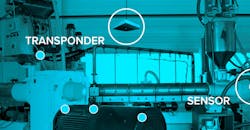Just as we’re getting used to the idea of wireless everything, Will Zell, CEO and co-founder of Nikola Labs, says industries should get ready for another mindset shift: the transition from wired to wireless power delivery.
“Twenty or 30 years from now, after this revolution has taken its course, wireless power will be part of our everyday lives,” Zell predicts.
Until then, this revolution still has some debugging to do. The main limitation of wireless pressure transmitters and similar sensors that make up today’s wireless world is that batteries must be replaced or recharged periodically. This can be especially problematic when sensors are located deep within machinery or otherwise difficult to access. Furthermore, machines often must be shut down so wireless devices can be serviced. This can sap plant productivity.
“Battery-powered sensors have a life of one to three years,” Zell explains. “That’s okay if you have one device, but imagine if you have a thousand. You’d have to hire a full-time maintenance person who walks around doing nothing but replace batteries. That’s a nightmare.”
Nikola Labs introduced VERO, its answer to this problem at the 2019 Reliable Plant Conference held in Cleveland last month. VERO is an equipment monitoring system designed to simplify maintenance and perpetually power sensors without wires or disposable batteries. The technology, known as radio frequency to direct current (RF to DC), works by sending an RF signal from a transmitter to a receiving device that interprets radio waves into realizable power. The interpretation is done by capturing the RF energy on an antenna, rectifying the wave, boosting voltage, and managing the DC power to charge a storage element or directly operate a device.
The VERO system can monitor temperature and vibration at key points on process-critical equipment so maintenance and reliability managers can easily monitor equipment health acting when necessary to reduce downtime. Doing so enables a plant to shift from a time-based maintenance schedule to one that is condition-based.
“No one wants to be walking around taking vibration readings,” Zell says. “Even if they do, those infrequent readings will never generate enough data for maintenance managers to implement a condition-based maintenance schedule. If I just give you vibration data, and you don’t have any context, it’s like handing a patient an EKG report and expecting them to figure out what’s going on with their heart. VERO analysts are going to be aware of problems and will proactively recommend action.”
Although the VERO platform will most immediately impact manufacturers, Nikola plans to roll out its wireless power platform across all industries. New software features are planned for release every few months, while new hardware will be introduced every nine months.
VERO is subscription-based and includes a free trial period. Custom design of the system, professional installation and lifetime hardware and software upgrades are included. For more information, click here.
About the Author
Tom Andel
Tom Andel is an award-winning editorial content creator and manager with more than 35 years of industry experience. His writing spans several industrial disciplines, including power transmission, industrial controls, material handling & logistics, and supply chain management.

Leaders relevant to this article:

